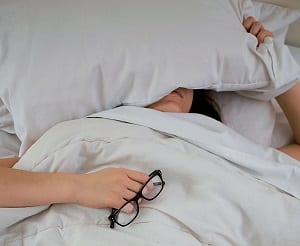The Warning Signs of Sleep Apnea
 Millions of people struggle with sleep disorders. Sleep disorders can be mild or severe. Some sleep disorders are even deadly. If you can’t sleep during the night and often feel fatigued during the day, it is likely that you have a sleep disorder. In particular, if you struggle to breathe during your sleep, the sleep disorder you may have could be sleep apnea. People who have sleep apnea must see a specialist for treatment.
Millions of people struggle with sleep disorders. Sleep disorders can be mild or severe. Some sleep disorders are even deadly. If you can’t sleep during the night and often feel fatigued during the day, it is likely that you have a sleep disorder. In particular, if you struggle to breathe during your sleep, the sleep disorder you may have could be sleep apnea. People who have sleep apnea must see a specialist for treatment.
What Is Sleep Apnea?
Sleep apnea is a medical condition in which your breathing stops and restarts during your sleep cycle. Your breathing will continue to stop and restart throughout your sleep without intervention. There are two types of sleep apnea: central sleep apnea and obstructive sleep apnea.
Due to its nature, sleep apnea is life-threatening. If you suspect you have sleep apnea, you should speak with a medical professional who is trained to treat sleep apnea immediately.
Central Sleep Apnea
When you have central sleep apnea, your brain stops sending signals to your diaphragm. The diaphragm houses muscles that control your ability to breathe. When the brain stops communicating with the diaphragm, you will stop breathing temporarily.
Obstructive Sleep Apnea
On the other hand, when you have obstructive sleep apnea, your brain communicates normally with your diaphragm. Instead of a break in communication, something blocks or clogs your airways, obstructing your ability to breathe. For example, the soft tissue from your throat or tongue may slip into your airway as you’re sleeping, reducing or blocking the airway’s flow of oxygen.
How Do I Know If I Have Sleep Apnea?
The warning signs of this sleep disorder are consistent. If you have sleep apnea, more than likely:
You snore during your sleep.
You wake up gasping for air.
You wake up frequently throughout the night.
You suffer from headaches.
You struggle to stay awake during the day.
Sleep Apnea Doctor in Philadelphia, PA
Some people may underestimate the debilitating effects of sleep apnea because it is such a common condition. Despite popular belief, sleep apnea can have adverse effects on your career and relationships. Unless they start a sleep apnea treatment plan, people with sleep apnea can develop depression and anxiety due to their inability to sleep through the night. Don’t let this be you. To consult a sleep apnea specialist near you, call 215-241-0700 now.
